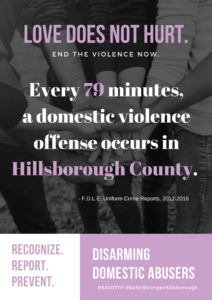
Our office is focused on implementing policies and initiatives that further our mission to promote public safety, reduce recidivism, and support a fair and just criminal justice system here in Hillsborough County. We are ambitious and optimistic in the programs and initiatives that we tackle, and work closely with criminal justice stakeholders, partners, and community members to accomplish significant and positive change.
Victim Assistance Program
813-272-6472
[email protected]
The Victim Assistance Program was established by Hillsborough County in 1985 to strengthen victim support and advocacy in this county. Florida Law provides a cadre of services designated to support victims and their families. Victims of crimes have the legal right to access this community of support. There are no fees for our services and we are available to assist any crime victim who is a resident of Hillsborough County or who was a victim of a crime occurring in Hillsborough County.
Please feel free to contact our office should you need anything, including questions or concerns about a pending case. Our Victim Assistance Program is available to you now, as the prosecution proceeds, and even after the case is closed.
The State Attorney's Office and other criminal justice stakeholders established the Adult Pre-Arrest Diversion Program (APAD) in July 2017. APAD allows individuals with minimal or no criminal history who commit an eligible misdemeanor offense to enter into an agreement where they accept responsibility, receive sanctions such as drug treatment or anger management, pay restitution and costs, and don’t re-offend. If they successfully complete the program, no charges are filed. If they fail, the case is referred to our office for prosecution. This cost-saving program is intended to improve public safety by reducing recidivism while addressing the offender’s underlying behavior and give individuals who’ve made minor mistakes another chance.
Our office was honored to lead the effort to expand and make permanent in Hillsborough County the Juvenile Arrest Avoidance Program, commonly referred to as the juvenile civil citation program. Launched on August 1, 2017, this program is an evidenced-based, smart alternative to the arrest and detention of juveniles for first-time minor offenses, allowing for early intervention into delinquency, and holding youth accountable with targeted and immediate sanctions. We worked with our criminal justice partners to implement an innovative approach to juvenile justice reform. Data supports the use of civil citations as a smart policy for Hillsborough County. Studies have shown that a youth is up to fifty percent less likely to reoffend after completing a civil citation program, as it significantly reduces the likelihood of the youth escalating into the juvenile justice system. In 2019, JAAP was expanded to include additional eligible offenses, including addressing instances of family violence.

Fatalities resulting from domestic violence continue to threaten the safety of Hillsborough County residents, take the lives of vulnerable victims, and affect the well-being of our children. On December 13, 2017, our office announced the "Disarming Domestic Abusers (DDA)" initiative. This initiative has two goals: to remove guns from domestic abusers who legally should not have them; and to make sure that they cannot acquire new guns. By keeping guns away from abusers, we will reduce domestic violence, help victims overcome the overwhelming, paralyzing fear that comes with having an abusive, armed partner, and hopefully save lives.
Summary of Policy
The State Attorney's Office will aggressively seek the relinquishment of firearms from domestic violence defendants through bond conditions, plea agreements, terms of probation, and entry into diversion programs. This applies to:
(1) any defendant who is prohibited by law from owning a firearm; and
(2) any defendant who has been charged based on probable cause with having committed an act of domestic violence.

Hillsborough County has consistently been ranked the worst or near the worst in Florida for DUI crashes, injuries, and fatalities. Given the dangers of impaired driving and the importance of reducing recidivism to promote long-term community safety, the State Attorney's Office established the Reducing Impaired Driving Recidivism (RIDR) initiative. RIDR seeks to aggressively target and reduce impaired driving by imposing enhanced sanctions like alcohol monitoring devices and DUI education programs on first-time, non-aggravated DUI offenders. RIDR also promotes consistency in the prosecution of DUI cases by eliminating the incentive for offenders to refuse to provide a breath sample during investigation.
RIDR is available for eligible offenses occurring on or after March 1, 2018.
The Misdemeanor Intervention Program (MIP) is a diversionary program for first time offenders. A defendant can only enter MIP with the consent of the Office of the State Attorney. Defense counsel should contact the assigned Assistant State Attorney to determine eligibility for their client. The MIP application can be downloaded here:
Our Veteran’s Treatment Court (VTC) is a problem-solving court that has become a national model for handling the unique issues facing veterans in our criminal justice system. VTC holds veterans accountable for their actions while simultaneously addressing underlying issues like PTSD, unemployment, homelessness, and drug and alcohol abuse. Working closely with the Thirteenth Judicial Circuit Court and the U.S. Department of Veterans Affairs, our office has implemented a phase-based system of treatment that matches the best practice model mandated by the Florida Supreme Court for problem-solving courts. Because of its success, our VTC is expanding as more veterans are being identified as suitable candidates for this specialty court, and we are seeking additional funding from the Florida Legislature to continue to grow this program to meet the needs of the servicemen and women in our community.
For too long, our criminal justice system has failed those suffering from mental illness. Annually, an estimated 2 million people with mental illness are booked into jails in our country—many for non-violent offenses. Our office is firmly committed to reducing the number of incarcerated criminal defendants with serious mental illnesses. We worked with the Thirteenth Judicial Circuit to establish a Mental Health Court (MHC) to oversee cases with individuals who have mental health challenges. Launched in February 2017, MHC allows individuals charged with certain crimes to participate in a diversion program which incorporates a treatment plan into the sanctions. Defendants who are charged with third-degree felony offenses and found incompetent to proceed are transferred to MHC, where a judge oversees their competency restoration training by various community agencies. In addition, defendants who have serious mental health illness now have the opportunity to receive extensive treatment and learn how to manage their illness with judicial oversight. MHC allows individuals for whom incarceration may be their only option to receive psychiatric treatment and extensive case management. The goal for these individuals is to identify, manage, and treat their mental illness so that they do not return to the criminal justice system. MHC is another example of how we are solving problems to reduce recidivism and improve community safety. For forms and information on Mental Health Court, click here.
The Adult Post-Adjudication Drug Court is designed to treat and assist those individuals whose drug and alcohol problems have resulted in being charged with a 3rd-degree felony. Individuals who have prior non-violent felony convictions and do not score mandatory state prison are eligible for this court.
Research shows more than 80% of all crimes are tied to drugs or alcohol. Using a proven clinical approach to address addiction, DETRR is designed to create an overall increase in our community’s safety by dealing with the underlying issues that lead to much of our area’s criminal behavior.
DETRR gives low-risk drug offenders who are accused of no other serious crimes an off-ramp out of the downward spiral of drug use, arrests, and incarceration. The program is limited to drug possession cases for low-risk, non-violent offenders; it is not allowed for drug dealers, violent offenders, or anyone deemed high-risk. Under DETRR, if offenders successfully follow the prescribed drug treatment or drug education program and stay arrest-free for six months, the drug possession charge will be dismissed.
DETRR embraces the well-established medical principle that, for offenders who suffer from substance abuse, treatment and rehabilitation are more successful at reducing repeat offenses and increasing public safety compared to a punishment-only approach, such as incarceration. Treatment and rehabilitation are more effective and less expensive than jail or prison. Additionally, this approach benefits the community beyond the criminal justice system by improving health outcomes and employment opportunities, both of which reduce the burden on taxpayers.
To learn more about the policy, click to view our DETRR webpage.
